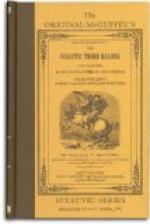7. The man would not sell it, of course. He was so rich now that he did not want to use it for himself; but every Christmas he ground out food and clothes and coal for the poor, and nice presents for the little children. So he rejected all the offers of the rich merchant. The merchant, however, determined to have it; he bribed one of the man’s servants to let him go into the castle at night, and he stole the mill and sailed away with it in triumph.
8. He had scarcely got out to sea, before he determined to set the mill to work. “Now, mill, grind salt,” said he; “grind salt with all your might!—salt, salt, and nothing but salt!” The mill began to grind and the sailors to fill the sacks; but these were soon full, and in spite of all that could be done, it began to fill the ship.
9. The dishonest merchant was now very much frightened. What was to be done? The mill would not stop grinding; and at last the ship was overloaded, and down it went, making a great whirlpool where it sank. The ship soon went to pieces; but the mill stands on the bottom of the sea, and keeps grinding out “salt, salt, nothing but salt!” That is the reason, say the peasants of Denmark and Norway, why the sea is salt.
Definitions.—l. De-vout’ly, in a reverent manner. 5. Re—flect’ing, throwing back light, heat, etc., as a mirror. Land’-mark, an object on land serving as a guide to seamen. Ex-traor’—di-na-ry, wonderful. 9. Whirl’-pool, a gulf in which the water moves round in a circle. Peas’ents, those belonging to the lowest class of tillers of the soil in Europe.
Exercises.—What is a “fairy tale”? What fairy people are told about in this story? How did the poor man find the way to the land of the dwarfs? Do you think the old man would have told him if the poor man had not been so polite? How did the poor man treat his rich brother in return for his unkindness? How was the greed of the dishonest merchant punished? What is meant by “strangers from foreign parts”? Where are Denmark and Norway?
V. POPPING CORN. (34)
1. One autumn night, when the wind was high,
And the rain fell in
heavy plashes,
A little boy sat by the kitchen
fire,
A-popping corn in the
ashes;
And his sister, a curly-haired child
of three,
Sat looking on, just close to his
knee.
2. Pop! pop! and the kernels, one by one,
Came out of the embers
flying;
The boy held a long pine stick in
his hand,
And kept it busily plying;
He stirred the corn and it snapped
the more,
And faster jumped to the clean-swept
floor.
3. Part of the kernels flew one way,
And a part hopped out
the other;
Some flew plump into the sister’s
lap,
Some under the stool
of the brother;
The little girl gathered them into
a heap,
And called them a flock of milk-white
sheep.




